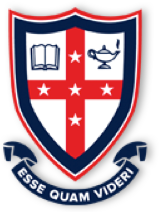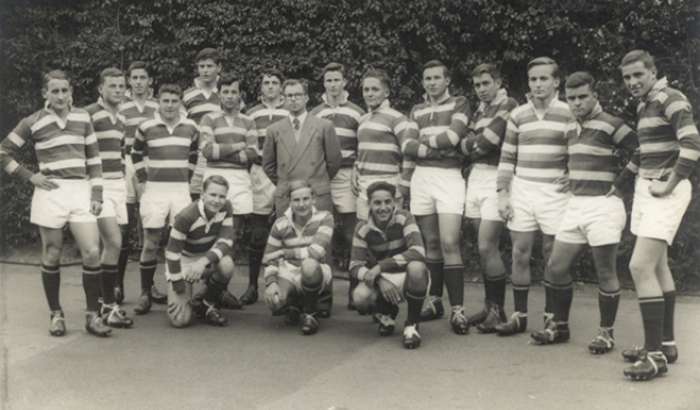Stories
Frank Tebbutt (OC 1944) and Dimitri Sverjensky (OC 1969)
Teacher–student relationships are one of the most significant factors affecting students’ development, school engagement and academic motivation.1 Committed to the values of compassion and companionship, personal best and the pursuit of excellence, Cranbrook has built a strong tradition of fostering supportive and positive teacher–student relationships.
Over his 20 year career at Cranbrook, teacher Frank Tebbutt (OC 1944) had a powerful impact on the production of high intellectual quality within our classrooms through his establishment and development of the school’s geology program. The achievements of Frank’s former student, Dimitri Sverjensky (OC 1969), as Professor of Earth and Planetary Sciences at Johns Hopkins University show that positive teacher–student relationships can lead to a lifelong love of learning and the active construction of knowledge for the betterment of our society.
After attending Cranbrook as a student from 1933 to 1944, Frank Trebbutt returned as a teacher in 1955. From his first year, Frank challenged both his students and the school body to pursue exciting new forms of enquiry. Upon starting, Frank put the case forward for the introduction of geology as a subject and encouraged our Headmaster to attend a lecture on geological education at the University of Sydney.2
To Frank’s surprise, the Headmaster was impressed and Frank quickly established the new department, spending all of his spare hours trawling the countryside for specimens of rocks and fossils for the classes.3 The subject was enthusiastically taken up by Cranbrook’s country boarders who would otherwise have found themselves disengaged by its alternative: French.
Cranbrook became one of the leading schools in geology in NSW and in 1963 Frank was appointed Science Master.4 From this position, he worked hard to adapt to new science syllabuses, writing the keystone textbook, Enquiring into the Earth in 1968.5
In 1969 Frank was elected as president of the NSW Science Teachers Association, producing articles for teachers outlining geological experiments and demonstrations that could be performed in the classroom, and ran a state-wide science competition.6 Frank not only supported students and teachers in his own field but, as Second Master at Cranbrook, also made a concentrated effort to bring previously disparate groups of staff together with social events that continue today.7
Dimitri Sverjensky, Professor of Geochemistry at Johns Hopkins University, is a former Cranbrook student who benefitted from Frank’s introduction of geography to the School curriculum. Dimitri cites Frank as having had a formative influence on his career by encouraging his love of the outdoors and teaching him the formulas of complex minerals, such as tremolite.8
Following his schooling, Dimitri completed a PhD at Yale.9 Over a career spanning more than thirty years, Dimitri’s interests in geochemistry have evolved from economic geology, to high temperature and pressure aqueous solution chemistry, to the geochemistry of the mineral–water interface.10
Dimitri, like Frank, constantly challenges established knowledge, with the findings from his recent studies challenging our understanding of the formation of life and what governs the long-term habitability of the planet.11 It was Dimitri’s formative education under Frank that led him to develop this influential academic engagement with deep knowledge.
- 1. Lauren Liberante, "The Importance of Teacher-Student Relationships, as Explored through the Lens of the NSW Quality Teaching Model", Journal of Student Engagement: Education Matters 2, No. 1 (2012).
- 2. The lecture was given by Leo Arthur Cotton, Professor of Geology. See Bede Nairn, Cotton, Leo Arthur (1883-1963), in Australian Dictionary of Biography (Melbourne, Vic: Melbourne University Press, 1981).
- 3. Frank Tebbutt, "Memoir" (Cranbrook Archives, 2016), 14.
- 4. Ibid.
- 5. K. S. McDonnell, D. G. Massey, and F. H. S. Tebbutt, Enquiring into the Earth (Croydon, Vic: Longmans, 1968).
- 6. Tebbutt, 18.
- 7. Ibid.
- 8. Dimitri Sverjensky, Professor, Johns Hopkins University, Zanvyl Krieger School of Arts & Sciences, http://eps.jhu.edu/directory/dimitri-sverjensky/.
- 9. Ibid.; Academic Background, http://pages.jh.edu/~dsverje1/.
- 10. Dimitri Sverjensky, Professor; Academic Background.
- 11. Dimitri A. Sverjensky, Vincenzo Stagno, and Fang Huang, "Important Role for Organic Carbon in Subduction-Zone Fluids in the Deep Carbon Cycle", Nature Geosci 7, No. 12 (2014); Scott Dance, "Research Explores How Building Blocks of Life Move from Deep within Earth", The Baltimore Sun, 28 December 2014.


